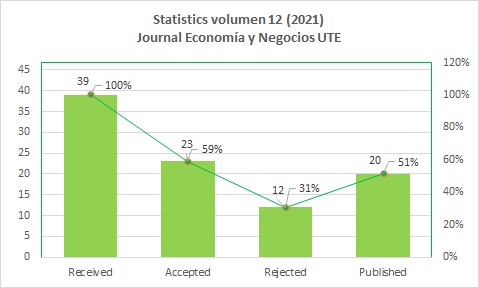Psychosocial Consequences of Shifts in the Productivity of a Wooden Furniture Factory
DOI:
https://doi.org/10.29019/eyn.v6i1.242Keywords:
work organization, psychosocial risks, risk levels, production, quality defectsAbstract
The 8-hour workday is a legitimate conquest of workers' rights that took place in Chicago. Also, production, defined as transformation of inputs into goods and services for consumption or investment, demands quality standards. This study was conducted in a wooden furniture private firm for export and domestic market sale. The research was held through observation using a descriptive method and cross-section analysis. The tools used were, for psychosocial risks, the assessment of psychosocial risks at work. For production and quality defects analysis, likert- scales. The study population is 60 employees, working in two shifts in wooden furniture industry. Both groups have similar demographic and labor characteristics. The research has shown that: The level of psychosocial risk in the company´s workers is very high, being greater those considered external to labor rather than labor risk, giving as a result a higher level of stress. The morning shift has more productivity and less stress that the evening group, there is a direct link between the organizational and production model based on several shifts, psychosocial risks and quantity and quality defects on the production process.
Downloads
Downloads
Published
How to Cite
Issue
Section
License
Copyright (c) 2015 The Authors

This work is licensed under a Creative Commons Attribution 3.0 Unported License.
The articles and research published by the UTE University are carried out under the Open Access regime in electronic format. By submitting an article to any of the scientific journals of the UTE University, the author or authors accept these conditions.
The UTE applies the Creative Commons Attribution (CC-BY) license to articles in its scientific journals. Under this open access license, as an author you agree that anyone may reuse your article in whole or in part for any purpose, free of charge, including commercial purposes. Anyone can copy, distribute or reuse the content as long as the author and original source are correctly cited. This facilitates freedom of reuse and also ensures that content can be extracted without barriers for research needs.
Creative Commons Attribution 4.0 International License
The Journal Economía y Negocios is distributed under a
Creative Commons Attribution 4.0 International (CC BY 4.0).

In addition, the journal Economía y Negocios guarantees and declares that authors always retain all copyrights to the original published works without restrictions [© The Author(s)]. Acknowledgment (BY): Any exploitation of the work is allowed, including a commercial purpose, as well as the creation of derivative works, the distribution of which is also allowed without any restriction.















